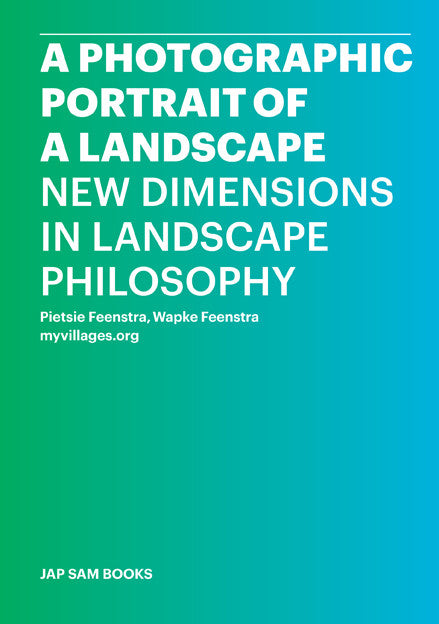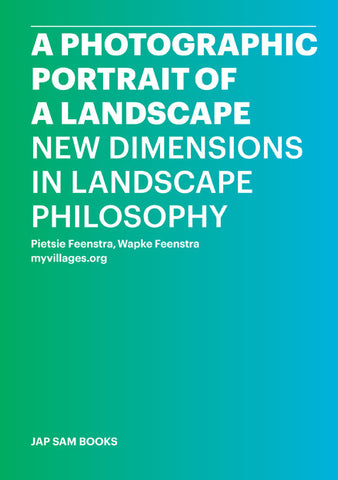Your cart is currently empty!
Theory
A Photographic Portrait of a Landscape
+++New Dimensions in Landscape Philosophy+++
+++Pietsie Feenstra, Wapke Feenstra, myvillages.org+++
978-94-90322-37-3
Mind Design - Niels Schrader
272
15,5 x 22 cm
Paperback
Date of Release: November 2012
English
In 2010 Jap Sam Books and Myvillages formed an editorial alliance to produce a new series of books. This is the second publication in this series of books.
Translation NL-EN Kathleen van Overzee-McMillian
The research for this publication was supported by Fryslan 2018 and Villagers of Wjelsryp.
This publication was made possible by the Mondriaan Fund and the Netherlands Architecture Fund.

The term 'landscape' lends itself to countless associations and expectations: there is no single, clear-cut definition of landscape. That's what makes landscape such a good starting point for philosophical questions about the dynamics of cultural centres, the views of institutions and the evolution of culture in a natural environment.
Who actually owned the land? Who created the landscape? Who determined the cultural rhythm? Who laid claim to the soil? This book unravels these questions and more.
A Photographic Portrait of a Landscape is a micro study that explores cultural centres and land ownership. The expansion of the European Union has been accompanied by a growing interest in national identity, which uses landscape as a projection screen for envisaged expectations. The theories of Ton Lemaire (Filosofie van het landschap,1970) and the post-colonial approach to culture of Homi K. Bhabha (The Location of Culture, 1994) are our guides on a journey through a landscape in the north of the Netherlands. 
Pietsie Feenstra's (Sorbonne Nouvelle, Paris III) essay on cultural history takes us on a filmic journey through a terp landscape in the Dutch province of Friesland, interpreting and uncovering its secrets by sifting through photographic images and delving into archives. She was inspired by an album of photos from 1978 that show the Frisian village of Wjelsryp.
The visual essay by Wapke Feenstra (myvillages.org) is a collation of recent landscape photos, photos taken by local residents, poetry, information about the land, and a grass herbarium. The landscape is presented from the perspective of the local dweller.
In the book eight poems by Beart Oosterhaven included, translated in to English by Geart fan der Mear.
About the authors
 Pietsie Feenstra lectures in the Cinéma et Audiovisuel, Arts et Média Department at the Sorbonne Nouvelle, Paris III, where she gained her PhD in 2001. She is part of the Théâtres de la Mémoire research group at the Sorbonne and specialises in the relationship between visual culture and historical writings in changing political contexts. Her latest publications include Miradas sobre pasado y presente en el cine español (1990-2005), Hub. Hermans (ed.), Rodopi, 2008; Mémoire du cinéma espagnol 1975-2007, (ed.) CinémAction, 2009; New Mythological Figures in Spanish Cinema. Dissident Bodies under Franco, Amsterdam University Press, 2011.
Pietsie Feenstra lectures in the Cinéma et Audiovisuel, Arts et Média Department at the Sorbonne Nouvelle, Paris III, where she gained her PhD in 2001. She is part of the Théâtres de la Mémoire research group at the Sorbonne and specialises in the relationship between visual culture and historical writings in changing political contexts. Her latest publications include Miradas sobre pasado y presente en el cine español (1990-2005), Hub. Hermans (ed.), Rodopi, 2008; Mémoire du cinéma espagnol 1975-2007, (ed.) CinémAction, 2009; New Mythological Figures in Spanish Cinema. Dissident Bodies under Franco, Amsterdam University Press, 2011. 
Wapke Feenstra is an artist who derives her inspiration by tapping into local knowledge. Her projects include Former Farmland (Ars Electronica, Linz 2008 and Oldenburg 2009), which explores how memories on a two-dimensional photographic screen can redefine and question the sites that we encounter. Her Moving Landscape project, which ran from 2009 till 2011 in Genk (Belgium) and the surroundings, was a visual roam through land use and primary industries. Feenstra intervenes in an existing visual experiential ecology, in an existing landscape (usually rural, but not always) in order to coax the locals and visitors into providing new or current readings of that landscape.
myvillages.org
 Myvillages.org - In 2003 Kathrin Böhm (London, UK), Wapke Feenstra (Rotterdam, NL) and Antje Schiffers (Berlin, GER) founded myvillages.org, an artists' initiative that explores the rural environment as a place for and of cultural production. Under the umbrella of myvillages.org, they run long-term and collaborative projects such as the Bibliobox and the International Village Shop. Working in different constellations, they organise multidisciplinary rural conventions, sell goods in one-hour-village-shops, publish books, screen films and mount exhibitions. Lately, they filled a year-long larder with food, drinks and knowledge to host guests in Haus der Kulturen der Welt in Berlin (2011).
Myvillages.org - In 2003 Kathrin Böhm (London, UK), Wapke Feenstra (Rotterdam, NL) and Antje Schiffers (Berlin, GER) founded myvillages.org, an artists' initiative that explores the rural environment as a place for and of cultural production. Under the umbrella of myvillages.org, they run long-term and collaborative projects such as the Bibliobox and the International Village Shop. Working in different constellations, they organise multidisciplinary rural conventions, sell goods in one-hour-village-shops, publish books, screen films and mount exhibitions. Lately, they filled a year-long larder with food, drinks and knowledge to host guests in Haus der Kulturen der Welt in Berlin (2011).
New Dimensions in Landscape Philosophy
€24.50
A Photographic Portrait of a Landscape
New Dimensions in Landscape Philosophy
€24.50
Art / Bookazines / Series / Landscape | Nature / Philosophy / Photography / Poetry / Theory
978-94-90322-37-3
Mind Design - Niels Schrader
272
15,5 x 22 cm
Paperback
Date of Release: November 2012
English
In 2010 Jap Sam Books and Myvillages formed an editorial alliance to produce a new series of books. This is the second publication in this series of books.
Translation NL-EN Kathleen van Overzee-McMillian
The research for this publication was supported by Fryslan 2018 and Villagers of Wjelsryp.
This publication was made possible by the Mondriaan Fund and the Netherlands Architecture Fund.

The term 'landscape' lends itself to countless associations and expectations: there is no single, clear-cut definition of landscape. That's what makes landscape such a good starting point for philosophical questions about the dynamics of cultural centres, the views of institutions and the evolution of culture in a natural environment.
Who actually owned the land? Who created the landscape? Who determined the cultural rhythm? Who laid claim to the soil? This book unravels these questions and more.
A Photographic Portrait of a Landscape is a micro study that explores cultural centres and land ownership. The expansion of the European Union has been accompanied by a growing interest in national identity, which uses landscape as a projection screen for envisaged expectations. The theories of Ton Lemaire (Filosofie van het landschap,1970) and the post-colonial approach to culture of Homi K. Bhabha (The Location of Culture, 1994) are our guides on a journey through a landscape in the north of the Netherlands. 
Pietsie Feenstra's (Sorbonne Nouvelle, Paris III) essay on cultural history takes us on a filmic journey through a terp landscape in the Dutch province of Friesland, interpreting and uncovering its secrets by sifting through photographic images and delving into archives. She was inspired by an album of photos from 1978 that show the Frisian village of Wjelsryp.
The visual essay by Wapke Feenstra (myvillages.org) is a collation of recent landscape photos, photos taken by local residents, poetry, information about the land, and a grass herbarium. The landscape is presented from the perspective of the local dweller.
In the book eight poems by Beart Oosterhaven included, translated in to English by Geart fan der Mear.
About the authors
 Pietsie Feenstra lectures in the Cinéma et Audiovisuel, Arts et Média Department at the Sorbonne Nouvelle, Paris III, where she gained her PhD in 2001. She is part of the Théâtres de la Mémoire research group at the Sorbonne and specialises in the relationship between visual culture and historical writings in changing political contexts. Her latest publications include Miradas sobre pasado y presente en el cine español (1990-2005), Hub. Hermans (ed.), Rodopi, 2008; Mémoire du cinéma espagnol 1975-2007, (ed.) CinémAction, 2009; New Mythological Figures in Spanish Cinema. Dissident Bodies under Franco, Amsterdam University Press, 2011.
Pietsie Feenstra lectures in the Cinéma et Audiovisuel, Arts et Média Department at the Sorbonne Nouvelle, Paris III, where she gained her PhD in 2001. She is part of the Théâtres de la Mémoire research group at the Sorbonne and specialises in the relationship between visual culture and historical writings in changing political contexts. Her latest publications include Miradas sobre pasado y presente en el cine español (1990-2005), Hub. Hermans (ed.), Rodopi, 2008; Mémoire du cinéma espagnol 1975-2007, (ed.) CinémAction, 2009; New Mythological Figures in Spanish Cinema. Dissident Bodies under Franco, Amsterdam University Press, 2011. 
Wapke Feenstra is an artist who derives her inspiration by tapping into local knowledge. Her projects include Former Farmland (Ars Electronica, Linz 2008 and Oldenburg 2009), which explores how memories on a two-dimensional photographic screen can redefine and question the sites that we encounter. Her Moving Landscape project, which ran from 2009 till 2011 in Genk (Belgium) and the surroundings, was a visual roam through land use and primary industries. Feenstra intervenes in an existing visual experiential ecology, in an existing landscape (usually rural, but not always) in order to coax the locals and visitors into providing new or current readings of that landscape.
myvillages.org
 Myvillages.org - In 2003 Kathrin Böhm (London, UK), Wapke Feenstra (Rotterdam, NL) and Antje Schiffers (Berlin, GER) founded myvillages.org, an artists' initiative that explores the rural environment as a place for and of cultural production. Under the umbrella of myvillages.org, they run long-term and collaborative projects such as the Bibliobox and the International Village Shop. Working in different constellations, they organise multidisciplinary rural conventions, sell goods in one-hour-village-shops, publish books, screen films and mount exhibitions. Lately, they filled a year-long larder with food, drinks and knowledge to host guests in Haus der Kulturen der Welt in Berlin (2011).
Myvillages.org - In 2003 Kathrin Böhm (London, UK), Wapke Feenstra (Rotterdam, NL) and Antje Schiffers (Berlin, GER) founded myvillages.org, an artists' initiative that explores the rural environment as a place for and of cultural production. Under the umbrella of myvillages.org, they run long-term and collaborative projects such as the Bibliobox and the International Village Shop. Working in different constellations, they organise multidisciplinary rural conventions, sell goods in one-hour-village-shops, publish books, screen films and mount exhibitions. Lately, they filled a year-long larder with food, drinks and knowledge to host guests in Haus der Kulturen der Welt in Berlin (2011).











